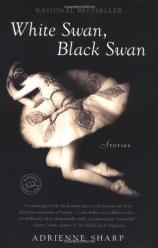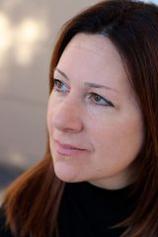Excerpt
Excerpt
White Swan, Black Swan

Bugaku
I've got a heating pad on my knee, an ice pack on my ankle, and I'm smoking a cigarette, which I shouldn't be doing, but Ridley's making me nervous. He's dancing tonight, not me, but that's not what's on his mind. He wants to talk. He wants to talk about turning thirty last week in Chicago, about moving to a bigger apartment when we get back to New York after the tour, about buying furniture, or at least a sofa, about getting married, about having a baby. Even though I've been with Ridley for four years now, ever since I was fifteen, none of this has ever come up. Dancers don't do those kinds of things. You're at the studio by ten, home from the theater after midnight: there's no energy for anything else. And a baby? That's at least a year off, if you ever make it back. But I don't want to fight with Ridley: I wouldn't want him to fight with me two hours before my curtain. So right now, I'm smoking a cigarette and trying to ignore all this.
"Don't answer me, Joanna," Ridley says from his side of the bed. "Try something new."
He disappears into the bathroom, abandoning me to this hotel room: a triple bureau and a writing desk, two wide beds with obelisks for headboards, a wing chair. Maybe this is what got him started. Nothing wrong with a good hotel room. I just don't see why we have to have all this stuff at home. We pretty much live at the theater; our apartment is only a warehouse for laundry and mail. I put out my cigarette, which was actually from Ridley's pack — we alternate, swearing off tobacco — and go back to what I was doing before he came out of the shower: going through my theater trunk. I've got about thirty pairs of pointe shoes dumped all over the bed, some white, some pink, some with the shanks ripped out, some I've used for two ballets but still can't bear to part with. I find the white shoes I need for Bugaku tomorrow night, for my first really big role — it's just me and Nilas out there on the stage for the whole adagio — and then Ridley's out of the bathroom again. I creep over to the door with my white shoes and silently stick the tips of them into the doorjamb, crunch the door closed. I've got to break the shoes in.
"Do you have to do that now?" Ridley says.
I turn to look at him, shoes on my hands. Without saying another word, he gets his bag and then opens the door to the hall and slams it behind him.
In about twenty minutes I'll go to the theater to watch him dance.
.
He's doing "Rubies," Eddie Villella's old role in Jewels. I'll be dancing Suzanne Farrell's role in "Diamonds" winter season back in New York. We're constantly replacing each other, but we never really own the roles. What Balanchine made for Farrell or Villella will always be theirs. To me Ridley looks like a young Eddie Villella, with that same robust energy and muscular attack. He's already on with Molly by the time I get to the wings in my leather jacket and twenty bracelets — I keep expecting there will be cabs all over the streets in L.A. — and I have to hold my hands over my forearms to keep the jangling muted as the two of them speed through the slapstick contortions that mark the opening movement. Molly has her hair wound into a cone that sits on her head like a pointed horn Ridley has to dodge, and her legs are astonishingly strong and knotted with muscles, almost the legs of a runner. But it's Ridley who does the running, peeling away from her for that wonderful, unexpected lap around the stage. Molly holds out her hand when he returns to her. Ridley slept with her once, when we were first going out, when he couldn't believe he was considering an affair with a child and felt compelled to make an effort to be with a woman his own age.
Ridley was already a principal dancer then, and I was just out of the School of American Ballet, earning $175 a week in the corps. I was prepared to adore him from afar forever when I was picked to rehearse Firebird with him; they always use a young girl for that, young and fast. But I turned out not to be that type of dancer, not fast enough, not vibrant enough. Management didn't like the way I looked with Ridley, either, and to this day I'm still being cast with Nilas Martins, who's more of a Jacques d'Amboise type, all height and elegance.
But Ridley and I came together anyway. The baby and the star. I can't even imagine being in the company and not being with him. He's taken care of me, practically brought me up. When my parents and my brother James come to New York, it's like, who are these people, they can't help me, nothing they know is of any use to me. Ridley's the one who got me out of the corps, who tells me what to say when my contract's negotiated, who still coaches me in all my roles. He's the one who showed me how I lost out on Firebird because I wasn't concentrating hard enough, because I didn't block out everything but the image of that wild, jeweled bird so that when I moved I was nothing but hollow bones, feathers, and air. Ridley's the reason I just signed this season as a principal dancer. He's the reason I'm starting to make it. Dancing and Ridley: synonymous. Or, anyway, used to be.
Molly pitches herself into the wings at the end of their variation and collapses in a parody of exhaustion, does a free fall onto her back, a red angel in the snow, but there's no snow here, it's hard floor she falls on. She heaves spastically, going, "Oh God, I can't do this," but of course she can, she does it night after night. I watch her as she tries noisily to recover her breath, and I think, Why am I standing here holding my bracelets? as she goes on gasping, twenty decibels above the orchestra, while Ridley begins his solo. His skin is pale beneath the crossed straps and wide armholes of his jeweled costume, but his face is jubilant. His solo is half tongue-in-cheek, half big bravura, and I watch the way he flirts with the audience on a slow cross step and then vaults into the air away from them—theirs for only a moment. I grip the black canvas folds of one of the wings.
Beside me Molly slowly recovers, but not too slowly, she has only two minutes, and she begins doing the kind of repair work you do in the wings, ribbons, hair, straps, and then we're both standing there, side by side, watching Ridley. She whispers, "Do it, do it." She's there with him in a way I can never be. I'd trade places with her in a minute — just let me dance with Ridley, she can sleep with him.
Okay, maybe that's an exaggeration.
But I am jealous, really jealous of the absolute knowledge she has of his body. He's so beautiful, truly soulful, when he's moving; he has an absurd kinetic confidence that lets him skim cream through any role, his body magically and alternately built for speed and gyration, elongated for purposes of carriage and line. He's like a god out there in that white light.
.
Outside Ridley's dressing room it's the usual pandemonium of delirium and relief, girls running around in tights saturated a translucent pink, their hair equally wet, yelling about how the tempo was off or watch out for that one part of the stage that was so slick. I can smell them from here, that heady, familiar mix of perfume, hair spray, he-man stink, and resin, which rises like a grainy mass and follows us everywhere. Other girls in their white "Diamonds" costumes for Act III of Jewels warm up, sweaters and Baggies masking until the last minute their scooped out, spindly legged profiles. Ridley comes in, a towel twisted around his neck and the legs of his tights pocked and streaked with whatever black stuff Molly scruffed up off the stage and spattered onto him. His hair is greased into a multitude of tiny pointed spikes, something Balanchine probably never would have allowed, even though he let us girls do any outrageous thing we wanted as long as it made us magnificent.
"Joanna," he says, and he shuts the door behind him, sticks his hands inside my leather jacket, which is his, and I have that moment I often have where I can't believe Ridley belongs to me. He's got me up on the dressing table, backed against the mirrors into which he's wedged his talismans: various photographs of us, of his best friend Don, who retired last year, of Rudolf Nureyev, of Erik Bruhn. I've stuck a Polaroid up there, too, of Ridley blowing out the candles on the cake we brought onto the stage last week, his face miserable above the strip of flame. He's not miserable now, though, he's luminous and wet, face orange and beige, the black lines around his eyes unraveling into a blur.
"I was good, wasn't I, Joanna?" Ridley says. "I was very, very good." His tongue is thick in my mouth, swollen and bizarre from his exertions, and he's unwrapping my clothes, and then his, which are sticky and all coiled inside each other, his jeweled top, then his tights, and the cup he's started wearing when he partners Molly. Ridley's saying, "Talk to me, Joanna," until I say, Yes, you were very, very good, and then he barks and growls, licks at what he can reach until I can smell my skin coming off his breath. We're always like this after a performance.
The first time we made love was in Ridley's dressing room at the theater. We'd just finished Nutcracker and I'd knocked on his door with a Christmas present for him — a gold tie clip I had taken an absurd amount of time to choose, especially since Ridley didn't own any ties. I was nervous. My hair was down, still clouded with grit and the odd fleck of paper snow. Or what passed for snow after a month of Nutcrackers, with the stagehands sweeping the flakes up off the filthy stage for the twenty-ninth time and dumping them on us for the thirtieth. Ridley pulled open the blue ribbon on my present, and then he pulled some speck from my hair, and then we were touching each other, Ridley going, "I don't believe I'm gonna do this to you, Joanna, have you ever done this before?" and I was afraid even to shake my head no, afraid he might stop what he was doing. Now Ridley's going, "Tell me you'll marry me, Joanna." He makes me cling to him while he parades me about the small room, holding my mouth to his, his hands under my thighs, his body the axis around which all other objects rotate and blur. I've got my head back and I'm almost saying yes, and then I catch a glimpse of myself in the mirror, a woman in street clothes hanging on to a man in costume, and that's exactly what I'm afraid of.
Excerpted from White Swan, Black Swan © Copyright 2003 by Adrienne Sharp. Reprinted with permission by Ballantine Books. All rights reserved.
White Swan, Black Swan
- paperback: 256 pages
- Publisher: Ballantine Books
- ISBN-10: 034543868X
- ISBN-13: 9780345438683



